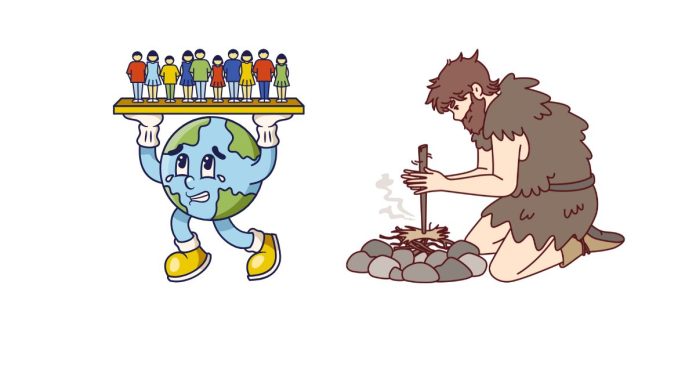The question, Who was really the first man on Earth and where did he come from? has intrigued humans for centuries. While it’s often discussed in the context of evolution, science, and religion, there’s no single definitive answer. Instead, the story is complex and involves a blend of anthropology, archaeology, and our understanding of human history.
In this blog post, we’ll explore the concept of the first human, the origins of Homo sapiens, and how scientists have pieced together the puzzle of where and when the first humans appeared.
The Scientific Perspective: Human Evolution
From a scientific standpoint, the first “human” was not a single individual, but a gradual process over millions of years. According to the theory of evolution, early human ancestors evolved over time, with Homo sapiens being the most recent species in a long line of hominids.
1. The Evolutionary Timeline
The first creatures that can be considered human ancestors appeared millions of years ago. Key milestones in human evolution include:
- Australopithecus: One of the earliest ancestors, who lived around 4 to 2 million years ago. Australopithecus was an upright walker and is considered one of the first primates to display human-like traits.
- Homo habilis: Around 2.5 million years ago, Homo habilis emerged, showing greater brain size and tool-making abilities, marking a significant step toward becoming more like modern humans.
- Homo erectus: Roughly 1.9 million years ago, Homo erectus, the first species to use fire and develop more advanced tools, appeared. They also began migrating out of Africa, signaling a more widespread human presence across the globe.
2. The Emergence of Homo Sapiens
The species we most closely identify with as “human” is Homo sapiens, which first appeared in Africa around 300,000 years ago. These early humans exhibited advanced cognitive abilities, the use of complex language, and the creation of art and cultural practices. Fossil evidence suggests that Homo sapiens were part of a larger group of hominids that lived alongside other species like Neanderthals and Denisovans.
Where Did the First Humans Come From?
The concept of the “first man” is tied closely to our understanding of human origins. While the first modern humans likely lived in Africa, the exact location is still debated. Here are some key areas where the earliest humans have been identified:
1. Africa: The Cradle of Humanity
Most anthropologists agree that the first Homo sapiens evolved in Africa. Fossils and genetic evidence suggest that early humans lived in Africa for thousands of years before beginning to migrate to other parts of the world.
- East Africa: Fossils found in regions like Ethiopia and Kenya have been crucial in understanding the emergence of early Homo sapiens. These regions are often referred to as the “Cradle of Humankind.”
- Southern Africa: Other fossil evidence points to early human development in southern Africa, with the oldest Homo sapiens fossils discovered in sites like the Omo Valley in Ethiopia.
2. The Great Migration Out of Africa
Between 60,000 and 80,000 years ago, Homo sapiens began migrating out of Africa, eventually populating the rest of the world. This migration is known as the “Out of Africa” theory and is supported by both genetic studies and archaeological evidence. Over thousands of years, humans spread across Asia, Europe, and eventually to the Americas and Oceania.
Is There a “First Man”?
The idea of a “first man” is somewhat misleading. Human evolution was not a sudden event, but rather a slow and complex process that occurred over millennia. It is more accurate to think of early humans as a population of people gradually evolving, rather than a single individual being the “first man.”
Moreover, scientific evidence shows that Homo sapiens did not emerge as a fully distinct species in a single moment, but rather as a gradual process of genetic changes and adaptations. The “first human” would not have been radically different from those around him, and the line between humans and their closest ancestors was not clear-cut.
The First Man and Human Origins
So, who was the first human on Earth, and where did he come from? From a scientific perspective, there wasn’t one “first man”—rather, Homo sapiens evolved over hundreds of thousands of years, with early humans originating in Africa. The “first” Homo sapiens were likely part of a population that gradually developed traits distinguishing them from other hominid species, and over time, they spread across the globe.
This journey of human evolution is an ongoing field of study, with new discoveries constantly reshaping our understanding of where and how we came to be. The story of the first humans is more about a collective journey rather than a single individual—an amazing, evolving narrative of life on Earth.


